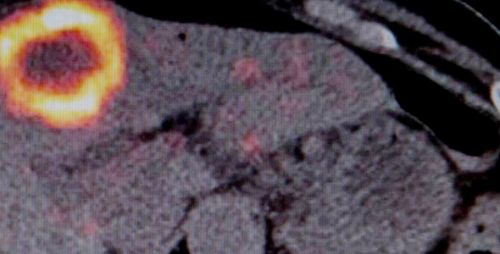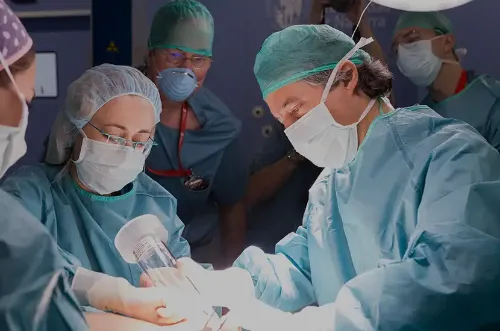Early Detection Program: Liver Cancer
Liver cancer is the sixth most common tumor disease and the third leading cause of cancer death worldwide. In Spain, about 6,500 new cases are diagnosed each year, and 850,000 worldwide. Its incidence is increasing.
Hepatocarcinoma is the most frequent malignant tumor of the liver. It occurs mainly in people with known or unknown chronic liver diseases caused by viral hepatitis, chronic consumption of alcoholic beverages, even in quantities that may not seem excessive, and metabolic syndrome in obese people or those with diabetes. In people with these chronic liver diseases, periodic follow-up by means of simple tests almost always makes it possible to detect the tumor at an early stage, without symptoms, when the chances of cure are at their highest.
At the Clínica Universidad de Navarra, the Liver and Pancreatic Cancer Area has a highly specialized multidisciplinary team made up of surgeons, hepatologists, medical and radiation oncologists, general and interventional radiologists, endoscopists, nuclear physicians and pathologists. This team has extensive experience in making an effective early detection and a personalized and successful treatment for each case.

Do you want to carry out this prevention program?
Request an appointment to be assessed by our specialists
Why at the Clínica Universidad de Navarra
Diagnostic speed
Because at the Clinica all diagnostic tests can be completed in a short period of time so that treatment is not delayed.
Specialized team
Our specialists are highly trained in liver diseases, ensuring accurate interpretation of imaging tests and biopsies.
Multidisciplinary approach
The teamwork of the specialists ensures that all treatment options are always assessed to guarantee the best personalized advice and the most ambitious and cutting-edge treatment.
Clinical Trials
The Clinica's patients have access to the most innovative treatments through clinical trials, offering advanced therapies.
Learn about the Liver Cancer Early Detection Program
What does it consist of?
- Specialized nursing consultation.
- Analysis with tumor markers.
- Ultrasound or MRI without contrast.
The frequency and choice of tests are determined by the individual risk of each person. Thus, the follow-up is closer and more intense in those at higher risk.
Who is it aimed at?
- Patients with chronic liver disease caused by viral hepatitis, chronic consumption of alcoholic beverages, metabolic syndrome or others.
- Liver cirrhosis of any origin.
- People with a family history of liver cancer.
Diagnosis and treatment of Liver Cancer at the Clínica Universidad de Navarra

If a suspicious liver lesion is detected in the tests performed, the diagnosis is made by means of imaging tests with contrast (CT or MRI).
Sometimes it is necessary to complete the study with a biopsy of the lesion.

If a tumor is detected early, the objective is to eliminate it. For this purpose, different options are available, the choice of which depends on the state of the liver and the general condition of the patient.
- Surgery: Resection of part of the liver by laparoscopy or liver transplantation.
- Thermal ablation: Inserting a needle in the center of the tumor that emits heat by radiofrequency or microwaves to destroy the tumor tissue.
- Radioembolization: Injecting radioactive particles into the hepatic artery that selectively lodge in the tumor.
- External radiotherapy: Using techniques that intensely and very selectively irradiate the tumor, such as proton therapy or resonance-guided linear accelerator.
The best professionals at your disposal
Formed by specialists in Digestive, Medical Oncology, Radiation Oncology, General Surgery, Radiology, Nuclear Medicine, Pathological Anatomy and follow-up with specialized nurses.





















































